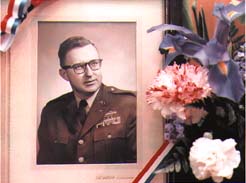|

![]()
|
|
|
Eileen
Wiley
1961-2006 |
Citifare workers ask
restoration of pay cut
by Eileen Wiley
The employees of the Citifare bus system have asked the Regional Transportation Commission of Washoe County to restore unauthorized and unnecessary expenditures which we feel were deducted from our paychecks.
Without notifying the commission, Ryder/ATE, Inc., the foreign-owned contractor which manages the system, committed $113,841.32 to import 36 Cincinnati strikebreakers for a work stoppage which never happened.
Dividing $113,841.32 by 36 means each strikebreaker cost $3,162.26 for no work. There has never been a strike in the history of this bus system. I was a member of the contract negotiation committee which voted to accept a two percent per year raise rather than go on strike. The commission itself budgeted a three percent increase for us, but Ryder/ATE would not offer it.
We place a great value on serving Citifare riders and did not want to see that relationship disrupted by negatively impacting people's lives. Some good things in the final contract helped us accept a pay raise which will not keep up with the cost of living.
Management did not make this bitter pill any easier to swallow when it subsequently made a presentation to commissioners projecting inflation at three percent per year.
Ryder/ATE should not expect its workers to sacrifice when it will not. The company's contract with the Regional Transportation Commission calls for a four percent increase in its management fee every year until 2003. On July 1, 1999, their price increased from $23,096 to $24,020 per month. This huge amount provides three executives to the bus system with all expenses extra.
We were understandably outraged when we found out that Ryder/ATE executives committed all that money to the strikebreakers without seeking commission approval, something they had ample opportunity to do.
Ryder/ATE spent a total of $136,083.32 for so-called security services for a non-event. That amount divided by 173 Nevada workers comes to $786.61 each.
Dividing $786.61 by 2,080 hours (one year at full time) results in 37.8 cents per hour. Citifare's top-paid workers - those at the highest level of merit and longevity earning $14.53 per hour under the old contract - could thus have received an additional pay raise of 2.6 percent in the first year on top of the two percent as it now stands. Lower paid workers would have enjoyed an even higher percentage increase.
We have asked the commission for a one-time only bonus matching what Ryder/ATE unnecessarily spent. That will still leave us below the cost of living in the second and third years of the agreement.
The system enjoys the financial soundness to accommodate this request. The commission easily approved Ryder/ATE's demand to retroactively authorize the strikebreaker expenses.
This small amount constitutes simple fairness to the hardworking employees of this award-winning system. Almost every worker has signed a petition asking the commission to demonstrate that we should get at least a fraction of the pay raise percentage Ryder/ATE has given itself.
![]()
Dispatcher Eileen Wiley is a 16-year RTC/Citifare employee and a shop steward for Teamsters Union Local 533/AFL-CIO.
"Citifare workers ask restoration of pay cut" originally appeared as a guest editorial in the Reno Gazette-Journal on 9-16-99.
![]()
|
|
|
Todd
Koch
|
Labor Day
'99: Back to the Future
by Todd Koch
"The cost of living in Reno is about on a par with general conditions in the Middle West and Western communities," reads an advertisement from the Reno Chamber of Commerce.
"The average scale of wages in the trades is
as high as any other city in America," the ad continues.
"If you desire to build, you will find
property at reasonable prices in comparison with other cities. Labor conditions
in Reno are ideal. With the close bond between the buyer and seller of
labor, strikes are unknown in Reno, and under normal conditions, there
is always work to be found. All trades in Reno are on a union basis."
Such were conditions in Reno according to the Chamber's 1927 commemorative program for Nevada's Transcontinental Highways Exposition. The event was held in Idlewild Park to celebrate the completion of the great and grand Lincoln Highway across America. The California Building is a lasting reminder of that time.
The interstate put us on the road to growth. Tourism and divorce ranches expanded. Gambling was legalized four years later.
Why can't the Reno of 1999 boast of wages "as high as any other city in America?"
Perhaps because that "close bond between the buyer and seller of labor" (management and workers) has been strained, twisted and sometimes broken. The meaning and dignity of work have been devalued.
The average Reno worker's pay generally pales by comparison to Las Vegas. Workers migrate to where wages are higher and where they receive respect. We now face shortages of teachers, construction workers and other trades. This newspaper just ran a major story on the need for skilled machinists.
In Reno, we worry over a low paid and, in some cases, aging work force. The average American construction worker is now 49 years old. Who will build the high rises to house the businesses and institutions needed to sustain the community in the future? A new hotel or schoolhouse cannot be faxed in from Bangladesh.
We must learn from the past: "Labor for the various Nevada mines, ranches, lumber mills and construction camps adjacent to Reno is furnished from our city," asserted the Chamber's 1927 booklet. Nevada organized labor is doing its best to uphold that statement. Our apprenticeship programs train those whose pay rates will drive up wages for everyone else.
In the construction industry, we strive for project labor agreements which ensure a steady stream of skilled workers and true labor peace of the 1927 variety.
Northern Nevada is now seeing all types of workers organizing and joining unions to obtain the benefits of bargaining collectively, the principal reason for the difference in wages between northern and southern Nevada.
We want to go back to the future so that on Labor Day 2027, the Greater Reno-Sparks Chamber of Commerce can once again advertise the Biggest Little City in the World as a place to live and work with high wages, reasonable property prices and ideal labor conditions.
If everyone concerned makes good faith efforts, the good old days will come back again.
![]()
Todd Koch is business manager of Painters and Allied Trades Union Local 567/AFL-CIO.
"Back to the Future" originally appeared as a Labor Day guest editorial in the Reno Gazette-Journal on 9-6-99.
![]()
Assays of a Senior Layman: A Touch of Patriot History
by Orland T. Outland
[Editor's note: A wise man once said, "if you stand for nothing, you will fall for anything." The following has everything to do with principle, without which you cannot stand for labor or anything else. It describes the lonely lot of those who wouldn't waver from the right way and the always-high price to be paid for such heroism.]
Although July 4th is past, I think it is still appropriate to pass on something I received from a U.S. Navy colleague about the signers of the Declaration of Independence.
|
|
Have you ever wondered what happened to the 56 men who signed the Declaration of Independence?
Five signers were captured by the British as traitors,
and tortured before they died. Twelve had their homes ransacked and burned.
Two lost their sons serving in the Revolutionary Army - another had two
sons captured. Nine of the 56 fought and died from wounds or hardships
of the Revolutionary War.
They signed and pledged their lives, their fortunes, and their sacred
honor. What kind of men were they?
Twenty-four were lawyers and jurists. Eleven were
merchants; nine were farmers and large plantation owners - men of means,
well educated. But they signed the Declaration of Independence knowing
full well that the penalty would be death if they were captured.
Carter Braxton of Virginia, a wealthy planter and trader, saw his ships
swept from the seas by the British Navy. He sold his home and properties
to pay his debts and died in rags.
Thomas McKeam was so hounded by the British that he was forced to move his family almost constantly. He served in the Congress without pay, and his family was kept in hiding. His possessions were taken from him, and poverty was his reward.
Vandals or soldiers looted the properties of Dillery, Hall, Clymer, Walton, Qwinnett, Hayward, Ruttledge, and Middleton.
General Cornwallis had taken over the Nelson home for his headquarters. He quietly urged General George Washington to open fire. The home was destroyed and Nelson died bankrupt.
Francis Lewis had his home and properties destroyed. The enemy jailed his wife, and she died within a few months.
John Hart was driven from his wife's bedside as she was dying. Their 13 children fled for their lives. His fields and his gristmill were laid to waste. For more than a year he lived in forests and caves, returning home to find his wife dead and his children vanished. A few weeks later, he died from exhaustion and a broken heart. Norris and Livingston suffered similar fates.
Such were the stories and sacrifices of the American Revolution. These were not wild-eyed, rabble-rousing ruffians. They were soft-spoken men of means and education. They had security, but they valued liberty more. Standing tall, straight, and unwavering, they pledged: "For the support of this declaration, with firm reliance on the protection of the divine providence, we mutually pledge to each other, our lives, our fortunes, and our sacred honor."
They gave you and me a free and independent America. The history books never told you a lot of what happened in the Revolutionary War. We didn't just fight the British. We were British subjects at that time and we fought our own government.
So, take a couple of minutes and silently thank these patriots. It is not too much to ask for the price they paid.
![]()
Orland T. Outland is a retired U.S. Army officer and current Trustee of the Nevada Council of Senior Citizens. He twice served as chair of Common Cause Nevada. The above column was originally published in the 8-23-99 Daily Sparks (Nev.) Tribune and has been reproduced by permission of Maj. Outland.
![]()
Labor
Links  About the Editor
About the Editor  Letters
Letters
Español
 Campaign '98-Y2K
Campaign '98-Y2K Nevada Labor History
Nevada Labor History
Breaking
News & Bulletins |
U-News
Statewide Roundup
|
In Search Of... |
Español | Annual
César Chávez Celebration
Barbwire by Barbano | Nevada Labor History
NevadaLabor.com Front Page | U-News
Archives |
BallotBoxing.US
DoctorLawyerWatch.com
| Barbwire Oilogopoly Archive
War Rooms: Cable
TV, Cancer Kids, Energy,
Resurge.TV, Starbucks,
Wal-Mart
The
Flagger Moms of Orange Cone Hell | Save
the Cabbies
Labor
Links | Nevada Writers | About the Editor
Search this site
![]()





